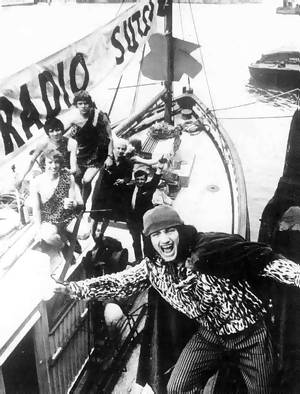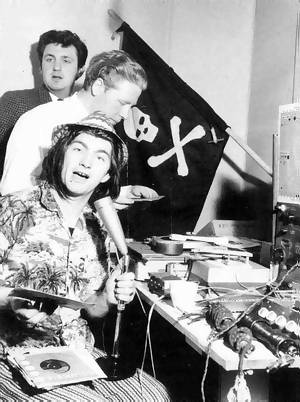Radio City was a great little radio station. Although it was always short of money, used only the most basic equipment and never managed to put out a signal strong enough to reach a mass market, it won a loyal
following in the home counties. Many offshore disc jockeys got their start on Radio City before moving on to better paid jobs elsewhere and, despite the high turn-over of staff, especially during the first year of its existence,
the station put out consistently entertaining programmes.
Radio City grew out of a publicity stunt, Radio Sutch. On 24th May 1964 pop performer David “Screaming Lord” Sutch launched Britain's third offshore radio station, named after himself. Radio Sutch was not a
serious venture. The flamboyant singer hired the trawler Cornucopia. Bedecked with skull and crossbones flags, this small vessel put to sea with numerous pressmen there to record the scene. The newspapers lapped up the
story and plastered pictures of Sutch all over the front pages, just as he had hoped.
|

|
|
Lord Sutch, foreground, with Jeff Mew, Brian Paull, Colin Dale, Paul Nicholas and Paul's friend Ron on board the Cornucopia. Photo by Keystone, reprinted from ‘Offshore Radio’,
published by Iceni Enterprises.
|
It is thought unlikely that Sutch ever actually broadcast from the Cornucopia. DJ Colin Dale has told The Pirate Radio Hall of Fame
that the vessel was only used for publicity purposes. The equipment, such as it was, was soon transferred to a disused war-time anti-aircraft fort complex in the Thames estuary, Shivering Sands.
Radio Sutch commenced transmissions with a power of less than 1 kilowatt on an announced wavelength of 197 metres (in fact 195 metres, 1542 kilohertz). The first record on the station was, of course, one of Sutch's own:
Jack the Ripper.
One of a chain of anti-aircraft forts built in the estuary during the Second World War, Shivering Sands was old, rusty and dangerous but considerably more stable than a 70 foot trawler like the Cornucopia. The disc-jockeys
consisted of Sutch himself, his band-mates and their associates, his manager Reg Calvert, members of Calvert's family and a couple of engineers trying desperately to keep the shambles on the air.
 Screaming Lord Sutch on his own radio station. The lack of basic studio equipment, like slip-mats on the turntables, meant that it was impossible for the disc-jockeys to cue the records up accurately. They just had to keep
talking until the music started! Recording courtesy of Nick Widdows (duration 2 minutes 13 seconds)
Screaming Lord Sutch on his own radio station. The lack of basic studio equipment, like slip-mats on the turntables, meant that it was impossible for the disc-jockeys to cue the records up accurately. They just had to keep
talking until the music started! Recording courtesy of Nick Widdows (duration 2 minutes 13 seconds)
 Sutch's manager, Reg Calvert playing records and plugging another one of his acts, The Fortunes, in the very early days of Radio Sutch (duration 1 minute 34 seconds)
Sutch's manager, Reg Calvert playing records and plugging another one of his acts, The Fortunes, in the very early days of Radio Sutch (duration 1 minute 34 seconds)
 Sutch's road manager, Brian Paull takes his turn behind the microphone. Recording courtesy of Martyn Webster (duration 1 minute 7 seconds)
Sutch's road manager, Brian Paull takes his turn behind the microphone. Recording courtesy of Martyn Webster (duration 1 minute 7 seconds)
As a publicity stunt it was highly successful but, as a radio station, it left something to be desired. At the start Sutch's transmitter was powered by car batteries rather than the usual generators and
could only stay on the air for a few hours at a time. The DJs frequently had to put out appeals for food, water or fuel. The station was billed as “Britain's first teenage radio station”. This tied in with Sutch's
alternative career in politics. The previous year he had stood for parliament in a by-election caused by the resignation of the disgraced MP John Profumo under the banner of the National Teenage Party.
|

|
|
Lord Sutch on the air with Brian Paull (left) and Reg Calvert behind him. Photo by Syndication International, reprinted from ‘Offshore Radio’, published by Iceni Enterprises.
|
Although neither the programmes nor the studio equipment were of the highest quality, Sutch did introduce one programming novelty: his station featured readings of the rude bits of D.H Lawrence's Lady Chatterley's Lover,
recently the subject of a famous obscenity trial, and John Cleland's 18th century erotic novel Fanny Hill on its late night broadcasts. He also played recordings of the comedian Max Miller, who was considered too
‘near the knuckle’ for the BBC. However the transmitter was of such a low power that very few people could hear the shows, let alone be offended by them.
 Reg Calvert attempting to play an instalment of Lady Chatterley's Lover but having turntable problems in the early days of the station (duration 1 minute 31 seconds)
Reg Calvert attempting to play an instalment of Lady Chatterley's Lover but having turntable problems in the early days of the station (duration 1 minute 31 seconds)
Radio Sutch did not carry many commercials. In fact the main advertisers were ‘Andy's of Whitstable’, a record shop which supplied discs in return for publicity, and ‘Cliff Davis Cars of
Shepherds Bush’, who looked after the Sutch band's travel arrangements when they were on tour. Some advertisements for local businesses were read out of a Whitstable newspaper and the companies then approached to see
if they might be interested in paying for more plugs but there was no organised sales team. Sutch said that, unlike the other stations, his would be financed by gifts received from grateful recording artists after the airplay
on Radio Sutch had brought them fame and fortune. This did not amount to very much.
 Alone on the fort Paul Elvey sorts out the technical problems, keeps the music playing and appeals for supplies. All in a day's work on Radio Sutch! Recording courtesy of Nick Widdows (duration 3
minutes 3 seconds)
Alone on the fort Paul Elvey sorts out the technical problems, keeps the music playing and appeals for supplies. All in a day's work on Radio Sutch! Recording courtesy of Nick Widdows (duration 3
minutes 3 seconds)
Once the novelty had worn off and the publicity value decreased, Lord Sutch tired of his toy. With a general election looming, he wanted to concentrate on his political career. He also had a lucrative tour of Australia and
New Zealand in the offing. He decided it was time to move on but, while he had been losing interest in the station, his manager had become more and more fascinated by its possibilities. Reg Calvert was a shrewd businessman
and could see the possibilities. He bought Sutch out for £5,000. The singer went off on his tour and, in September 1964, Calvert re-launched the station under a new name: Radio City.
 The name may have changed but Reg Calvert is still plugging The Fortunes! Recording courtesy of Nick Widdows (duration 13 seconds)
The name may have changed but Reg Calvert is still plugging The Fortunes! Recording courtesy of Nick Widdows (duration 13 seconds)
|


![]() The name may have changed but Reg Calvert is still plugging The Fortunes! Recording courtesy of Nick Widdows (duration 13 seconds)
The name may have changed but Reg Calvert is still plugging The Fortunes! Recording courtesy of Nick Widdows (duration 13 seconds)